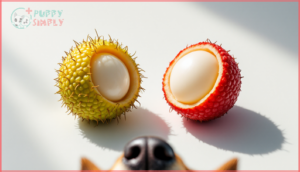This site is supported by our readers. We may earn a commission, at no cost to you, if you purchase through links.
You peek out the window and spot your dog happily munching on something small and pink that fell from your neighbor’s lychee tree. Your stomach drops. While these sweet tropical fruits make a cooling snack for humans, they’re not worth the risk for your furry friend.
Lychee contains hypoglycin A, a compound that can drop a dog’s blood glucose dangerously low, especially in unripe fruit. The seeds and leathery skin create choking hazards, and even the flesh—though less dangerous when fully ripe—packs enough sugar to upset your dog’s system.
Before you panic or dismiss lychee as just another forbidden food, understanding what makes this fruit risky helps you respond appropriately if your dog sneaks a bite.
Table Of Contents
- Key Takeaways
- Can Dogs Eat Lychee?
- What Makes Lychee Risky for Dogs?
- Which Parts of Lychee Are Unsafe for Dogs?
- Potential Health Benefits of Lychee for Dogs
- Safe Ways to Offer Lychee to Dogs
- Symptoms of Lychee Poisoning in Dogs
- Healthier Fruit Alternatives for Dogs
- Tips for a Balanced Canine Diet
- Frequently Asked Questions (FAQs)
- Can I give lychee to my puppy?
- Can dogs eat lychee fruit?
- Are lychees good for weight loss?
- Can dogs eat unripe lychee?
- Can dogs eat lychee pits?
- How many lychees can a puppy eat?
- Do different dog breeds react differently to lychee?
- Can diabetic dogs have lychee as treats?
- What time of day is best for feeding lychee?
- How long does lychee stay fresh for dogs?
- Conclusion
Key Takeaways
- Lychee contains hypoglycin A, a toxin that can crash your dog’s blood sugar to dangerous levels within hours, with unripe fruit and seeds posing the highest risk of metabolic crisis requiring emergency veterinary care.
- The seeds and leathery skin create serious choking hazards that can block your dog’s airway or digestive tract, while the high sugar content (9-15 grams per 100 grams) contributes to obesity and diabetes over time.
- If you choose to offer lychee, only give 1-2 small pieces of fully ripe, peeled flesh per week maximum after removing all skin and seeds, then monitor closely for 2-6 hours for signs like vomiting, weakness, or confusion.
- Safer fruit alternatives like apples, blueberries, and watermelon provide better nutrition with fewer risks, delivering more fiber and antioxidants without the toxicity concerns that make lychee a poor choice for most dogs.
Can Dogs Eat Lychee?
Dogs can eat lychee flesh in very small amounts, but it’s not worth the risk for most pet owners. While a bite or two of ripe lychee won’t usually harm your dog, this tropical fruit poses several safety concerns that make it a poor choice for canine health and nutrition.
If you’re looking for safer snack options, discover which crackers dogs can safely enjoy without the same digestive risks.
The combination of choking hazards, potential toxicity, and high sugar content means lychee falls into the category of foods you should really avoid when thinking about fruit safety for pets and toxic foods for dogs.
Dog owners should review the health benefits and risks of lychee before deciding to offer any to their pets.
What Makes Lychee Risky for Dogs?
Lychee isn’t the worst fruit you could give your dog, but it comes with some real concerns that go beyond just being a sugary treat.
The risks range from toxic compounds that mess with blood sugar to physical hazards that can block your dog’s digestive system.
Let’s break down the three main reasons this tropical fruit doesn’t make the safest snack for your pup.
Hypoglycin a and Toxicity
The most dangerous threat lurking in lychee is hypoglycin A, a toxic compound concentrated in unripe fruit and seeds. This toxin disrupts your dog’s energy production at the cellular level, triggering a metabolic crisis that can drop blood glucose dangerously low within hours.
Lychee contains hypoglycin A, a toxin that disrupts cellular energy and can dangerously crash a dog’s blood sugar within hours
Here’s what makes this fruit toxicity so serious:
- Hypoglycin A converts to MCPA CoA, blocking the enzymes your dog needs for normal energy metabolism
- The metabolic block prevents glucose generation, causing severe hypoglycemia symptoms like weakness and seizures
- Small dogs face higher risks from lower doses compared to larger breeds
- Fasting or poor nutrition magnifies the toxic effects substantially
- Emergency response requires immediate veterinary care with IV dextrose to stabilize blood sugar
High Sugar Content
Beyond fruit toxicity, ripe lychee delivers 9 to 15 grams of sugar per 100 grams—mostly glucose and fructose that spike blood glucose quickly.
Your dog doesn’t need those dietary carbs, and regular sugar intake from fruit nutrition like this can lead to obesity and canine diabetes over time.
That glycemic index impact isn’t worth the risk when balanced canine diet and wellness matters most for dog health and nutrition.
Choking and Blockage Hazards
A lychee seed measures just under 2 centimeters—small enough to lodge in your dog’s trachea or esophagus and cause complete airway obstruction. That means asphyxiation risks you can’t reverse at home.
The leathery skin adds another choking hazard, creating esophageal blockage that requires emergency foreign object removal. Both partial and total tracheal hazards demand immediate vet intervention for dog health.
Which Parts of Lychee Are Unsafe for Dogs?
Not all parts of the lychee fruit pose the same level of danger to your dog. Some components are simply inconvenient, while others can be downright hazardous to your pup’s health.
The outer skin and pit are the main culprits here, much like kiwi skin poses choking hazards that can be avoided with simple prep work.
Let’s break down which specific parts you need to keep away from your furry friend.
Skin and Seeds
Think of lychee peel and the lychee seed as the parts you really shouldn’t let your dog near. The skin’s rough texture can cause skin irritation or even skin allergies in sensitive pups, and it may contain compounds like saponin that upset digestion.
The seed structure is equally problematic—it’s large, glossy, and hard enough to create a serious choking risk or intestinal blockage. Seed removal tips are simple: peel away all skin, extract the entire seed, and only offer the small amount of translucent fruit texture that remains.
Unripe Vs. Ripe Lychee
Ripening process transforms lychee from a green, hard hazard into a red, somewhat safer treat—but unripe lychee contains far more hypoglycin A, the toxin that tanks blood glucose.
Ripe lychee has lower hypoglycin A levels yet higher sugar levels, which means different risks at different stages. Fruit texture shifts from firm and astringent to juicy and sweet as nutrient content evolves and shelf life shortens.
Even fully ripe specimens can carry trace saponin, so you’re not completely out of the woods either way.
Potential Health Benefits of Lychee for Dogs
While lychee comes with real risks, the flesh of ripe lychee does offer some nutritional value if you decide to share it with your dog. These benefits don’t necessarily outweigh the hazards, but it’s worth understanding what this tropical fruit brings to the table.
Here’s what the edible portion contains that could support your dog’s health.
Vitamin C Content
One ripe lychee fruit delivers roughly 0.6 to 1.0 milligrams of vitamin C—a fraction of what your dog needs daily. While this nutrient-rich food offers antioxidant effects and enhances immune function, citrus fruits and berries provide far more vitamin C per serving.
Fresh lychee beats canned versions for nutrient stability, but don’t count on it meeting canine nutrition requirements for this essential vitamin.
Fiber and Digestion
Fresh lychee delivers about 1.2 grams of fiber per 100-gram serving—mostly soluble fiber that forms a gel-like substance in your dog’s gut. This small amount can support regular bowel movements and feed beneficial bacteria in the colon, but it won’t replace fiber-rich staples in canine nutrition.
- Soluble fiber slows gastric emptying and moderates blood sugar spikes
- Fermentable fibers produce short-chain fatty acids that nourish colon cells
- Adequate water intake prevents digestion issues when fiber enters your dog’s diet
The trace fiber in one or two lychee pieces offers negligible digestive benefits compared to pumpkin or oats.
Antioxidants and Minerals
Lychee brings vitamin C and traces of copper and potassium to your dog’s bowl, but these nutrients won’t fix a mineral deficiency or replace antioxidant supplements prescribed by your vet.
Polyphenols in the fruit may support cellular defense, yet one piece delivers minimal antioxidant power. For balanced canine nutrition, commercial diets formulated to meet dietary balance guidelines outperform any single fruit snack.
Safe Ways to Offer Lychee to Dogs
If you’ve decided to share a small piece of lychee fruit with your dog, preparation is everything. You can’t just toss them the whole fruit and hope for the best—there are specific steps you need to follow to minimize risk.
Let’s walk through how to prepare lychee safely, how much to offer, and what warning signs to watch for afterward.
Preparing Lychee Properly
If you’re considering giving your dog lychee, preparation is everything for fruit safety. Start by confirming it’s ripe lychee—bright red skin that gives slightly when pressed.
Then follow these critical steps:
- Wash the fruit thoroughly under cool running water
- Peel away the entire leathery skin completely
- Remove the glossy brown seed from the center
- Serve only the translucent white flesh in small pieces
For more details about lychee’s, review expert sources for best fruit selection and preparation. Proper lychee peeling and seed removal eliminate major choking hazards while ensuring can dogs eat lychee safely.
Recommended Serving Size
Once prepared, portion control becomes your next priority in canine diet and wellness. For an average adult dog, stick to 1–2 small lychee segments per week maximum—moderation key here.
If it’s your dog’s first time, gradual introduction is critical: offer just one tiny piece and wait 24 hours. Frequency limits help avoid pet health risks like blood sugar drops or weight gain, so veterinary advice always recommends treating lychee as rare, not routine.
Monitoring for Reactions
After that first bite, stay vigilant for the next 2–6 hours. Reaction signs like vomiting or sudden weakness point to pet health risks—especially hypoglycemia. Watch for confusion or pale gums, both emergency response triggers.
If allergic reactions appear (facial swelling, hives), contact your vet immediately. Canine monitoring isn’t optional here; vet guidance on food hazards for animals can prevent serious toxicity tests later.
Symptoms of Lychee Poisoning in Dogs
If your dog gets into lychee poisoning—especially unripe fruit or the seeds—you need to know what warning signs to watch for.
Lychee poisoning can show up in different ways, and some symptoms appear more quickly than others.
Here’s what to look out for so you can act fast if something goes wrong.
Signs of Toxicity
If your dog has eaten lychee containing the toxic compound hypoglycin A, watch for these poisoning signs within 1 to 2 hours. Lethargy and weakness often appear first as hypoglycemia effects take hold.
You might notice vomiting or excessive drooling as your dog’s body tries to reject the toxin. In severe cases of fruit toxicity, seizure-like activity or collapse can occur, requiring emergency responses.
Hypoglycemia Indicators
Low blood glucose from hypoglycin A creates specific warning signs you can’t ignore. Your dog’s brain depends entirely on glucose, so deprivation triggers neurological signs that escalate quickly into a hypoglycemic crisis.
Watch for these hypoglycemia indicators during canine monitoring:
- Disorientation, stumbling, or appearing drunk as brain cells struggle without fuel
- Tremors or muscle twitching that can progress to full seizures
- Sudden collapse or unresponsiveness requiring immediate intervention
Blood glucose below 60 mg/dL confirms food poisoning and demands urgent care.
When to Seek Veterinary Help
Anytime your dog shows multiple hypoglycemia symptoms or seizures after eating lychee, consider this food poisoning that demands emergency veterinary care.
Contact poison control or rush to your veterinarian immediately—urgent treatment with glucose injections can prevent coma or death. Don’t wait to see if symptoms resolve on their own.
Emergency care and canine first aid expertise make the difference between recovery and tragedy.
Healthier Fruit Alternatives for Dogs
If you want to treat your dog to something sweet and nutritious, you don’t need to risk the potential dangers of lychee. There are plenty of safer fruit options that won’t put your dog’s blood glucose levels at risk or create choking hazards.
Let’s look at some vet-approved alternatives that offer better nutrition without the worry.
Safe Fruits and Portion Sizes
Instead of gambling with lychee, stick to tried-and-true options that offer better nutrition and fewer risks.
Safe fruits for dogs include:
- Apples (remove seeds) – Rich in fiber and vitamin C, offer small slices to support digestive health
- Blueberries – Antioxidant powerhouses perfect for small breeds, limit to a small handful
- Watermelon (seedless, no rind) – Hydrating and cooling, especially for large dogs on warm days
Keep all fruit treats under 10% of your dog’s daily calories to maintain balanced meals and proper pet nutrition.
Nutritional Comparison to Lychee
When you stack lychee against safer fruit choices, the numbers tell a clear story. Lychee delivers about 66 calories per 100 grams with 16.5 grams of carbohydrates, while apples offer just 52 calories and better fiber content at 2.4 grams.
Blueberries pack more antioxidants with lower fruit sugar levels, and watermelon provides better hydration at only 30 calories per serving. These alternatives give you better nutrient balance and mineral content without lychee’s dietary restrictions and toxicity concerns.
Tips for a Balanced Canine Diet
While lychee might seem like a fun treat, your dog’s everyday nutrition shouldn’t revolve around exotic fruits or table scraps.
A balanced canine diet starts with high-quality dog food that’s designed for your pet’s specific life stage and needs. Here are two essential principles to keep your dog healthy and thriving.
Importance of Species-Appropriate Foods
Your dog’s body evolved to run on animal protein and fat, not fruit sugars or grain fillers. Species appropriate foods mirror what canines need for ideal digestive health and nutrient balance, supporting everything from stable blood glucose to healthy coat condition. When you align dog diet and nutrition with biological needs, you’re investing in long-term pet health and wellness.
Three pillars of canine nutrition:
- High-quality meat as the primary protein source
- Minimal carbohydrates to match natural metabolism
- Whole foods over heavily processed kibbles with synthetic additives
Consulting a Veterinarian About Treats
Before tossing your pup any new treat, run it by your veterinarian—especially if lychee or other exotic fruits are on your radar. Vet guidance protects canine wellness by accounting for breed sensitivities, existing conditions, and daily calorie limits that dog owners and pet parents often overlook. A quick conversation ensures treat safety aligns with your pet’s unique needs.
| What Veterinary Advice Covers | Why It Matters for Pet Care and Wellness |
|---|---|
| Ingredient allergen screening | Prevents reactions in sensitive dogs |
| Portion control for weight | Avoids obesity and metabolic issues |
| Toxin identification | Blocks dangerous foods before harm occurs |
| Breed-specific recommendations | Tailors animal safety to size and age |
| Treat-diet balance | Promotes ideal pet nutrition long-term |
Veterinarians translate complex dog owner advice into actionable steps, turning uncertainty into confidence.
Frequently Asked Questions (FAQs)
Can I give lychee to my puppy?
Most puppy owners don’t realize lychee’s sugar concentration is roughly 15% by weight.
You can offer tiny amounts of ripe lychee flesh to your puppy, but remove the peel and seed first to prevent choking hazards.
Can dogs eat lychee fruit?
Yes, technically dogs can eat small amounts of ripe lychee flesh after you’ve removed the skin and seed.
However, given the fruit toxicity risks and high sugar content, it’s really not worth adding to your dog’s diet.
Are lychees good for weight loss?
For those chasing lighter numbers on the scale, lychee offers sweet relief—about 66 calories per 100 grams.
This low calorie fruit aids healthy snacking and calorie management within balanced weight loss tips.
Can dogs eat unripe lychee?
No, dogs absolutely shouldn’t eat unripe lychee. Unripe fruit contains hypoglycin A, which triggers dangerous blood glucose drops and potential neurologic symptoms.
Fruit ripening substantially affects toxicity levels—stick to ripe lychee only, following strict pet safety guidelines.
Can dogs eat lychee pits?
No—lychee pits are dangerous choking hazards that can lodge in your dog’s throat or create intestinal blockages.
The seeds also irritate the digestive tract, making pit removal methods essential before offering any fruit flesh.
How many lychees can a puppy eat?
A puppy should receive only one to two small flesh pieces as an occasional treat—no more than 10 grams per feeding.
This lychee intake ensures puppy nutrition tips align with veterinary advice on lychee serving sizes.
Do different dog breeds react differently to lychee?
Size outweighs genetics in the context of lychee sensitivity.
Toy breeds face higher hypoglycemia risk from small amounts, while larger dogs like Labradors generally tolerate minor lychee exposure better than petite companions.
Can diabetic dogs have lychee as treats?
No, diabetic dogs really shouldn’t have lychee as treats. The high natural sugar content can spike blood glucose levels unpredictably, complicating diabetes management and insulin adjustment despite glucose monitoring efforts under veterinarian supervision.
What time of day is best for feeding lychee?
Offer lychee in the morning when your dog has a full day to metabolize sugars and you can monitor reactions.
Midday works too, but avoid heavy feeding late at night to prevent digestive discomfort.
How long does lychee stay fresh for dogs?
Think of lychee like cut fruit at a picnic—it won’t last long. Refrigerate peeled lychee flesh and use within 24 hours. Room temperature? Four hours max before spoilage signs appear.
Conclusion
That lychee hanging from the branch isn’t forbidden fruit—it’s simply not designed for your dog’s system. The question “can dog eat lychee” doesn’t demand a hard no, but the combination of hypoglycin A, choking risks, and sugar content makes it a gamble with little payoff.
Skip the worry and reach for safer alternatives that deliver nutrition without the toxicity threats. Your dog’s health deserves better odds than this tropical fruit offers.
- https://spoiledhounds.com/can-dogs-eat-lychee/
- https://greg.app/lychee-toxic-to-dogs/
- https://www.cnn.com/2019/06/13/health/encephalitis-india-outbreak-deaths-lychee-intl/index.html
- https://nap.nationalacademies.org/resource/10668/dog_nutrition_final_fix.pdf
- https://pangovet.com/pet-nutrition/dogs/how-many-calories-does-my-dog-need/















